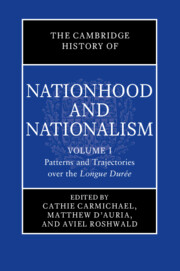Book contents
- The Cambridge History of Nationhood and Nationalism
- The Cambridge History of Nationhood and Nationalism
- The Cambridge History of Nationhood and Nationalism
- Copyright page
- Contents
- Figures
- Contributors
- General Introduction
- Part i The Politics of Ethnicity, Nationhood, and Belonging in the Settings of Classical Civilizations
- Part ii Paradigm Shifts and Turning Points in the Era of Globalization, 1500 to the Present
- 7 Colonial Expansion and the Making of Nations: The Spanish Case
- 8 The Reformation and National Identity
- 9 Europe’s Eighteenth Century and the Quest for the Nation’s Origins
- 10 Empire, War, and Racial Hierarchy in the Making of the Atlantic Revolutionary Nations
- 11 The Rise of the Charismatic Nation: Romantic and Risorgimento Nationalism, Europe, 1800–1914
- 12 Revolution and Independence in Spanish America
- 13 A Tale of Two Cities: The American Civil War
- 14 The Cycle of Inevitability in Imperial and Republican Identities in China
- 15 Colonial Subjects and the Struggle for Self-Determination, 1880–1918
- 16 The First World War
- 17 Anticolonialism and Nationalism in the French Empire
- 18 Patriotism in the Second World War: Comparative Perspectives on Countries under Axis Occupation
- 19 Decolonization and the Cold War
- 20 1968: The Death of Nationalism?
- Conclusion to Part II
- Index
Conclusion to Part II
from Part ii - Paradigm Shifts and Turning Points in the Era of Globalization, 1500 to the Present
Published online by Cambridge University Press: 27 October 2023
- The Cambridge History of Nationhood and Nationalism
- The Cambridge History of Nationhood and Nationalism
- The Cambridge History of Nationhood and Nationalism
- Copyright page
- Contents
- Figures
- Contributors
- General Introduction
- Part i The Politics of Ethnicity, Nationhood, and Belonging in the Settings of Classical Civilizations
- Part ii Paradigm Shifts and Turning Points in the Era of Globalization, 1500 to the Present
- 7 Colonial Expansion and the Making of Nations: The Spanish Case
- 8 The Reformation and National Identity
- 9 Europe’s Eighteenth Century and the Quest for the Nation’s Origins
- 10 Empire, War, and Racial Hierarchy in the Making of the Atlantic Revolutionary Nations
- 11 The Rise of the Charismatic Nation: Romantic and Risorgimento Nationalism, Europe, 1800–1914
- 12 Revolution and Independence in Spanish America
- 13 A Tale of Two Cities: The American Civil War
- 14 The Cycle of Inevitability in Imperial and Republican Identities in China
- 15 Colonial Subjects and the Struggle for Self-Determination, 1880–1918
- 16 The First World War
- 17 Anticolonialism and Nationalism in the French Empire
- 18 Patriotism in the Second World War: Comparative Perspectives on Countries under Axis Occupation
- 19 Decolonization and the Cold War
- 20 1968: The Death of Nationalism?
- Conclusion to Part II
- Index
Summary
In 1992, Eric Hobsbawm rejoiced in the fact that historians were making headway in the study of nationalism and that this, in turn, suggested that the phenomenon was “past its peak”: ‘The owl of Minerva which brings wisdom, said Hegel, flies out at dusk. It is a good sign that it is now circling round nations and nationalism.” Others, writing at that time, were less optimistic. The French essayist Alain Minc wrote of the resurgence of the nation and expressed his fears that Europe might soon become “entrapped, once again, in nationalistic reactions.” After half a century on the path toward internationalism, he argued, once again the nation would dominate the political horizon. A few years later, Anthony D. Smith even quipped that, if anything, we were experiencing the “high noon” of nationalism and the “owl of Minerva ha[d] not stirred.”1
- Type
- Chapter
- Information
- The Cambridge History of Nationhood and Nationalism , pp. 463 - 468Publisher: Cambridge University PressPrint publication year: 2023

